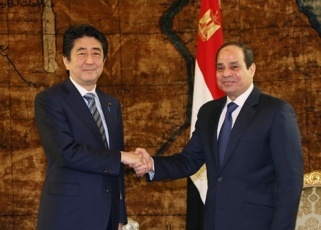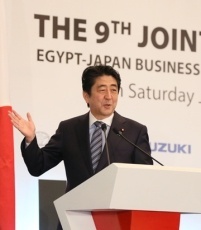Japan-Egypt Relations
Prime Minister Abe Visits Egypt
January 18, 2015
 Photo: Cabinet Public Relations Office
Photo: Cabinet Public Relations Office
 Photo: Cabinet Public Relations Office
Photo: Cabinet Public Relations Office
Prime Minister Mr. Shinzo Abe visited the Arab Republic of Egypt on January 16 (Friday) and 17 (Saturday). An overview of his visit is as follows:
1. Major Events
January 16 (Friday)
Visit to the Grand Egyptian Museum
Meeting with Prime Minister Ibrahim Mahlab
January 17 (Saturday)
A speech on policies on the Middle East at the Joint Meeting of the Japan-Egypt Business Committee
Summit meeting with President Abdel Fattah el-Sisi
Meeting between President Abdel-Fattah El-Sisi and economic mission
2. Overview of the Major Events
(1) Meeting with Prime Minister Ibrahim Mahlab and visit to the Grand Egyptian Museum
(A) On January 16, commencing at 6:05 p.m. (local time; 01:05 a.m. January 17 JST) for approximately 55 minutes, Prime Minister Shinzo Abe, who was on his visit to Egypt, held a meeting with Mr. Ibrahim Mahlab, Prime Minister of Egypt.
(B) Prime Minister Abe conveyed the following:
- Japan would like to open a new page of relations with a newly emerging Egypt. Japan would like to further strengthen bilateral relations with Egypt through enhancement of dialogue and cooperation at every level.
- Steady progress of democratic procedures in accordance with the roadmap was appreciated. Various efforts by the Government of Egypt for reforms as well as promotion of comprehensive development including measures against poverty, healthcare, and education were also appreciated.
- Japan is the best partner of Egypt for aiming at balanced progress and would proactively support the efforts by Egypt.
- An economic mission accompanied Prime Minister Abe and the Ninth Joint Meeting of the Japan-Egypt Business Committee was scheduled to be held. It is expected that Japanese enterprises will participate in national projects of Egypt to contribute to further expansion of economic relations.
- Prime Minister Abe welcomed a decision by Egypt Air to resume direct flight services between Japan and Egypt and wished that human exchanges between the two countries including tourism would be stimulated further.
- Concerning the Third UN World Conference on Disaster Risk Reduction to be held in March in Sendai, Prime Minister Abe expressed his expectation toward proactive participation of high-level officials from Egypt for the success of the conference.
- Prime Minister Abe expressed his expectation toward an early completion of the Grand Egyptian Museum construction plan, a new landmark of friendly and cooperative relations between the two countries.
- The Egypt Economic Development Conference to be held in March would be a great opportunity to upgrade the economic relationship between the two countries to a higher level.
(C) Prior to the meeting, Prime Minister Abe visited the site of the Grand Egyptian Museum Project, for which Japan provided yen loans.
(2) A speech on policies on the Middle East at the Joint Meeting of the Japan-Egypt Business Committee
On January 17, commencing at 9:00 a.m. (local time; 4:00 p.m. January 17 JST), for approximately 15 minutes, Prime Minister Abe attended the Joint Meeting of the Japan-Egypt Business Committee and delivered a speech on policies on the Middle East titled "The Best Way Is to Go in the Middle: Towards a Stable Middle East Imbued with Vitality -Japan and Egypt Turning a New Page-".
(3) Summit meeting with President Abdel-Fattah El-Sisi (Japan-Egypt Joint Statement was released following the meeting)
On January 17, commencing at 10:10 a.m. (local time; 5:10 p.m. January 17 JST) for approximately 60 minutes, Prime Minister Abe, who was on his visit to Egypt, held a meeting with Mr. Abdel-Fattah El-Sisi, President of the Arab Republic of Egypt.
At the beginning of the meeting, Prime Minister Abe stated that the trend of extremism emerging all over the world must be stopped, that he would like to expand the philosophy of "the best way is to go in the middle" together with President El-Sisi, and that in order to construct an energized and stable Middle East, Egypt should be stabilized and thrive to become a rising star of the region. Prime Minister Abe also added that Japan would strongly support Egypt and walk with them, and would like to further enhance the bilateral relationship through promotion of dialogues and cooperation at every level.
Situation in Egypt
Prime Minister Abe appreciated that the transition to democracy in accordance with the roadmap had been steadily progressing under the leadership of President El-Sisi, as well as the fact that the comprehensive development including measures against poverty had been promoted along with various efforts for reform, as well as President El-Sisi's call for religious tolerance and coexistence and efforts for independence of the judiciary.
President El-Sisi stated that the stability of Egypt is important for the region and the Government of Egypt was steadily implementing the roadmap. President El-Sisi also requested participation from Japan in the Egypt Economic Development Conference to be held in March and stated that toward the conference, the Government of Egypt had been improving the investment environment such as through economic reforms and integration of investment acts.
Bilateral relationship
Prime Minister Abe suggested the strengthening of strategic dialogues, exchanges between defense authorities, and beginning of periodic meetings between foreign/defense authorities.
Prime Minister Abe conveyed the decision of the Government of Japan to provide new yen loans amounting to approximately 43 billion yen for two projects, the "Electricity Distribution System Improvement Project" and "Borg El Arab International Airport Extension Project," and new assistance of approximately 4 million U.S. dollars through an international organization for the enhancement of border administration capabilities of Egypt and assistance of flood disaster measures.
Prime Minister Abe expressed his expectation toward the participation of Japanese enterprises into national projects of Egypt such as the Suez Canal area development project and at the same time affirmed his intention as the Government of Japan to encourage such projects through JBIC finance and NEXI trade insurance.
Prime Minister Abe welcomed the decision of Egypt Air to resume direct flight services to Japan and expressed his expectation toward further stimulation of human exchanges between the two countries based on tourism.
Prime Minister Abe welcomed the decision by the Government of Egypt to rivise the restrictions on imported products from Japan.
President El-Sisi stated that the Suez Canal area development project had been ongoing and expressed his expectation toward the participation of Japanese enterprises. Moreover, President El-Sisi expressed his gratitude for past cooperation from Japan for education, human resource raising, construction of the Great Egyptian Museum (GEM) and Egypt-Japan University for Science and Technology (E-JUST). In addition, President El-Sisi expressed his expectation toward an increase in the number of Japanese tourist more than ever before.
Cooperation in an international arena
Prime Minister Abe gave an explanation that the Government of Japan would more proactively contribute to the peace and stability of international society based on the policy of "Proactive Contribution to Peace" and requested support from President el-Sisi.
Prime Minister Abe expressed his expectation toward constructive roles of Egypt for the success of the 2015 Review Conference of the Parties to the Treaty on the Non-Proliferation of Nuclear Weapons (NPT).
Prime Minister Abe requested cooperation for the success of the Third UN World Conference on Disaster Risk Reduction to be held in March in Sendai.
Regional situation
(A) ISIL
Prime Minister Abe expressed his opinion that concerning the issue of ISIL, coordination between each country would be crucial and the role that Egypt assumes as a major power with history in the region would be great. Then, Prime Minister Abe also disclosed new assistance amounting to 200 million U.S. dollars, including 500,000 U.S. dollars for the enhancement of the border administration capabilities of Egypt as part of Japan's measures against ISIL.
President El-Sisi stated that since the issue of ISIL relates to safety and security of Egypt, he would appropriately deal with it.
(B) Middle East peace
Prime Minister Abe highly appreciated the important roles of Egypt in Middle East peace such as hosting the Conference on the Reconstruction of Gaza last year. Prime Minister Abe also stated that early resumption of negotiations for a two-state solution is necessary and both Israel and Palestine should maintain their composure, and requested both parties to make efforts for resuming peace negotiations.
President El-Sisi stated that for a two-state solution, it would be important to encourage Palestine and Israel to co-exist and he would like to cooperate with Japan for this purpose.
(4) Meeting between President El-Sisi and economic mission
On January 17, commencing at 11:20 a.m. (local time; 6:20 p.m. January 17 JST), for approximately 40 minutes, Prime Minister Abe, who was on his visit to Egypt, attended a meeting between Mr. Abdel-Fattah El-Sisi, President of the Arab Republic of Egypt, and an economic mission from Japan.
Prime Minister Abe stated that the development of economic relations were the driving force for strengthening the bilateral relationship, introducing representatives from Japanese enterprises, who have passion and track records in business with Egypt, had accompanied him and had meetings with business leaders of Egypt, and that the Government of Japan also considered proactive assistance in the development of private sector-based cooperation between the two countries toward the Egypt Economic Development Conference in March.

